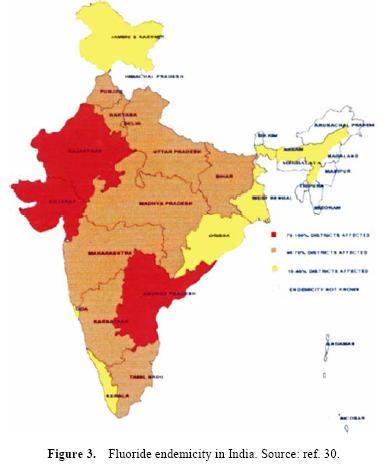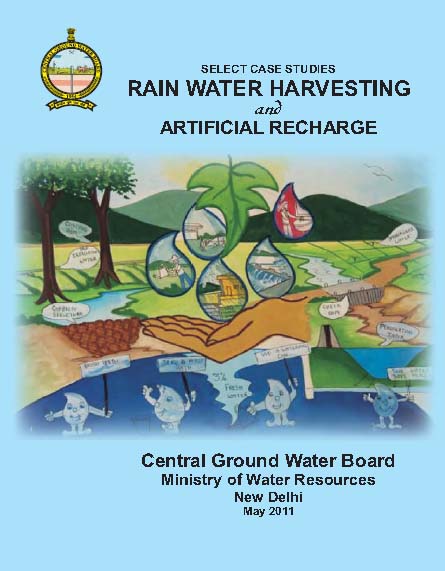/topics/groundwater-recharge
Groundwater Recharge
Challenges of sustainable water quality management in rural India - Current Science
Posted on 23 Aug, 2011 04:51 PM The article informs that access to safe drinking water remains an urgent necessity, as 30% of urban and 90% of rural households still depend completely on untreated surface or groundwater.
The article informs that access to safe drinking water remains an urgent necessity, as 30% of urban and 90% of rural households still depend completely on untreated surface or groundwater.
While access to drinking water in India has increased over the past decade, the tremendous adverse impact of unsafe water on health continues. It is estimated that about 21% of communicable diseases in India are water related.
Although some degree of intervention in terms of chlorination and monitoring of water quality exists in major cities and towns, rural India, which constitutes the bulk (70%) of the population, is usually deprived of such interventions. The population in rural India is mainly dependent on the groundwater as a source of drinking water. As a quality concern the groundwater is often found to be contaminated with fluoride, arsenic, iron and salts. In recent years, fluorosis has emerged as major public health issue in rural India.
Dynamic groundwater resources of Maharashtra – A report by CGWB and GSDA (2004)
Posted on 08 Aug, 2011 04:35 PMThis report on “Dynamic Ground Water Resources of Maharashtra (2004)” presents the groundwater estimates for the State of Maharashtra as computed by the Central Ground Water Board (CGWB) and Groundwater Survey and Development Agency (GSDA) based on the guidelines given by the Groundwater Estimation Committee (GEC-1997) constituted by Ministry of Water Resources (Government of India).
Maps generated from the integration of water level data of Central Ground Water Board and State Ground Water Board
Posted on 17 Jul, 2011 03:49 PMThe CGWB under the Ministry of Water Resources, Government of India, is the national apex agency entrusted with the responsibilities of providing scientific inputs for management, exploration, monitoring, assessment, augmentation and regulation of ground water resources of the country.
Groundwater - Nation’s water lifeline suffering multiple crisis – A presentation by Himanshu Thakker
Posted on 13 Jul, 2011 09:41 PM
This has been followed with a discussion on issues of quality and quantity. The importance of groundwater in India’s water sector is highlighted. The presentation discusses how an increase in overall irrigated area, in spite of decrease in contribution from big dam irrigation projects was possible due to the steep increase in groundwater irrigated areas.
Groundwater governance in India – A case study by World Bank
Posted on 09 Jul, 2011 11:43 AMIt examines the impediments to better governance of groundwater, and explores opportunities for using groundwater to help developing countries adapt to climate change. It attempts to understand the practical issues that arise in establishing robust national governance frameworks for groundwater and in implementing these frameworks at the aquifer level.
The case study focused on the national, state and local levels. At the national and state levels, it analyzed the policy, legal, and institutional arrangements to identify the demand and supply management and incentive structures that have been established for groundwater management. At the local level, it assessed the operations, successes, and constraints facing local institutions in the governance of a number of aquifers within peninsula India, on the coast and on the plain of the Ganges river valley.
Optimal water resource management in water stress condition : A Newsletter of AFPRO Volume 2, Issue 2 of July 2011
Posted on 07 Jul, 2011 11:29 AM Small and marginal farmers are most affected from water stress situations, and need simple, sustainable and effective measures for water conservation and management.
Small and marginal farmers are most affected from water stress situations, and need simple, sustainable and effective measures for water conservation and management.
Bhoo Jal Sangrah Dohavali (Groundwater recharging - A creation of poems in Hindi) by Awadesh Nema
Posted on 02 Jun, 2011 12:59 PMIt is an innovative version, and has been appreciated in many seminars and national workshops. It gives a logical treatment of mother earth based on human therapy.
For more information, please visit Awadhesh Nema's Blog.
Hkw&ty laxzg nksgkoyh
ty laxzg.k orZeku le; dh lcls cM+h ekax gS A ty dh izR;sd cwan dk laxzg.k vko';d gh ugha cfYd ,d vfuok;Zrk gksrh tk jgh gS A ty laxzg.k dk ;g iz;kl lekt ds izR;sd O;fDr ds }kjk fd;k tkuk pkfg;s A ty laxzg.k gsrq lekt dks tkx`r djus dh rFkk mUgsa blds fofHkUu mik;ksa dks le>kus dh ije vko';drk gS A ;fn lekt dk izR;sd O;fDr ty laxzg.k ds fofHkUu rduhdh rjhdksa ls voxr jgsxk rks og mUgsa vklkuh ls viuk ldsxk vkSj lekt ds fgr esa rFkk Lo;a ds fy;s Hkh ty laxzg.k ds bl ;K esa viuk ;ksxnku ns ldsxk A
Case studies on rainwater harvesting and artificial recharge – A compilation by Central Ground Water Board
Posted on 17 May, 2011 09:13 PM Groundwater caters to the demand of ever growing domestic, agricultural and industrial sector of the country and is being indiscriminately exploited by several users. On the other hand, rapid urbanization and land use changes has resulted in reduced natural infiltration or recharge of aquifers.
Groundwater caters to the demand of ever growing domestic, agricultural and industrial sector of the country and is being indiscriminately exploited by several users. On the other hand, rapid urbanization and land use changes has resulted in reduced natural infiltration or recharge of aquifers.
This has led to various problems related to quantity and quality and issues like the decline in water levels, depletion of groundwater resource and quality deterioration. There is thus an imperative need for augmenting the valuable groundwater resource. Artificial recharge and roof top rainwater harvesting is one such method that can revive this precious resource. Several traditional and scientifically proven artificial recharge and rainwater harvesting techniques have been adopted in different parts of the country. These structures have proven to be viable option for augmenting the groundwater aquifers by making use of surplus surface runoff.
Groundwater management in Andhra Pradesh - Time to address real issues – A report by Institute for Resource Analysis and Policy
Posted on 17 May, 2011 02:16 PMWith 49 per cent of the total irrigation from groundwater, the state of Andhra Pradesh accounts for 5.3 per cent of the net groundwater irrigated area in the country.





